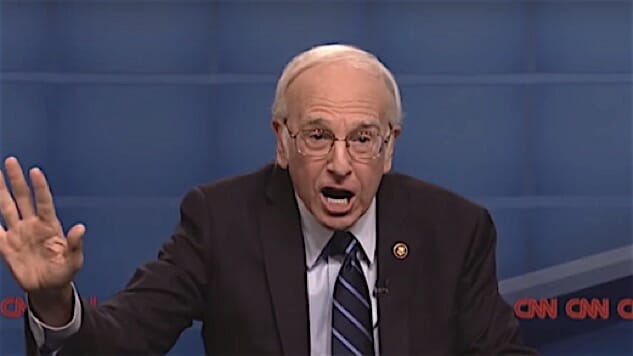How Saturday Night Live is Preparing America for Bernie Sanders

Going out to millions of American homes each weekend, Saturday Night Live has such reach that academics say the show even has an impact on presidential races. 10% of respondents to a 2008 poll said SNL actually influenced their vote that year, with any on-the-fence viewers most likely to have been convinced to stump for Obama. The so-called SNL effect has been in play since the NBC comedy’s inception: according to experts, Gerald Ford’s 1976 defeat by Jimmy Carter was in part influenced by Chevy Chase’s bungling portrayal of Ford on the show.
Executive producer Lorne Michaels has insisted SNL is politically neutral, but history suggests it’s often been more liberal than not. Just look at some of its most memorably outrageous political caricatures: Will Ferrell’s idiotic George W. Bush, Tina Fey’s cuckoo Sarah Palin, Chase’s clumsy Ford (while Michaels says there’s no bias, Chase has admitted he wanted Jimmy Carter to beat Ford in ’76.) Look at how the show has mercilessly sent up the 2015/2016 GOP stock as a bunch of amateurs and crackpots. More importantly this election season, look at what the show has done for Bernie Sanders.
Larry David has so far played Bernie Sanders on SNL on three occasions, and through a largely uncritical collection of sketches, David and the Saturday Night Live team have no doubt aided the Sanders campaign. SNL writer-star Colin Jost admitted as much in a recent interview with Seth Meyers, when he described audience reaction to David playing Sanders on the show: “I think he’s helped Bernie. Larry’s so likeable…that you’re like, ‘Oh yeah, Bernie Sanders, I’ve always liked him. I liked him in Curb.’”
Certainly David’s casting—which came about not because SNL nor NBC were looking to give Sanders a star boost, but simply because everyone involved agreed David had the perfect look for the part—hasn’t hurt Sanders’ image. Outside of SNL, Sanders had been the butt of jokes, about his age, about his appearance and manner, and about his politics. SNL has helped to normalize the senator’s image somewhat; skeptical voters told regularly by the press how obscure Sanders is have been reminded by SNL that they actually already respect one old, balding, Jewish curmudgeon from Brooklyn, New York.
Such is the uncanny similarity between David and Sanders that David’s portrayal brings the added bonus (for the Sanders campaign) of constantly insisting that what audiences love about David is what they also love about Sanders. It’s an almost symbiotic form of casting, with David having transferred some of his own popularity over to Sanders ever since the Sanders ‘character’ first showed up on SNL.
Even back in October, when Sanders was still way behind in the polls and considered unelectable by the media, David’s Sanders character was greeted by the audience like a rock star in the Dem debate skit. Meanwhile, Kate McKinnon’s Hillary Clinton got second billing, as ‘Sanders’—the real thing trailing Clinton by 20 points in national polls—got the loudest cheers and the most air time. To anyone not in the know, SNL made it look like Sanders was the Democratic frontrunner, not Clinton. It couldn’t have been any other way: in hiring Larry David, the SNL team were always going to have to make his character the most central. It just so happens that in the process they also gave prominence to a Democratic candidate that, at the time, was tied in the polls with someone that never even ran (that would be Joe Biden).
It’s not just additional familiarity that Sanders has been lent by SNL. Sanders’ reputation is built upon his resolute hammering home of the facts, often at a high volume. And so, SNL created a parody that reflects that: David’s passionate, crotchety and frugal Sanders (“I own one pair of underwear! Some of these billionaires, they got three, four pairs!”). But there’s nothing truly damaging or critical in this portrayal. If anything, heightening these characteristics serves to increase the real Sanders’ reputation as an economical, serious-minded politician that doesn’t prioritize image over the issues.
-

-

-

-

-

-

-

-

-

-

-

-

-

-

-

-

-

-

-

-

-

-

-

-

-

-

-

-

-

-

-

-

-

-

-

-

-

-

-

-








































